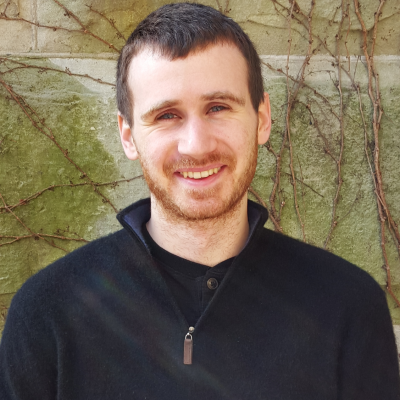Student Spotlight: Robert Chiodi

April 27, 2020
Robert Chiodi is a doctoral candidate in mechanical engineering from Abington, Massachusetts. After earning a bachelor’s degree at the University of Massachusetts Dartmouth, he chose to pursue further study at Cornell due to the faculty as well as the Ithaca area.
What is your area of research and why is it important?
I develop new techniques for computational fluid dynamics (CFD) simulations, specifically focusing on the process of liquid atomization. This process, where large liquid structures break up into smaller ones (picture the way that a spray bottle works) are encountered every day, occurring in the waterfalls around Ithaca and in your car engine when fuel is injected. Studying atomization through simulation can be much more flexible than performing physical experiments. As an example, experimentally studying atomization in the absence of gravity requires performing the experiment on the International Space Station, whereas in a simulation, it requires only changing one number.
What are the larger implications of this research?
Atomization is everywhere, from diesel fuel injection to spray coatings in pharmaceuticals, and my research makes it easier for us to understand these processes. Once understood, we can then control and improve them. Personally, I’m most interested in the potential to reduce human-caused climate change. A majority of the greenhouse gasses emitted into the atmosphere are generated in the energy and transportation sectors from technologies that heavily employ atomization. By making these processes more efficient or replacing conventional fuels with environmentally-friendly ones, greenhouse gas emissions can be drastically reduced.
What inspired you to choose this field of study?
I’ve always been excited about math and how it can be used to predict the outcome of events. Within that vein, fluid mechanics involves really complicated phenomena that have particularly interesting challenges associated with modeling their behavior. CFD arose and continues to grow with developments in computing. As computers get increasingly powerful, more and more interesting systems can be studied that will have long-lasting impacts on society. There are still many important discoveries to be made, and I am excited to be a part of that.
What have you gained by participating in the NextGen Professors Program?
As a first-generation college student, I understand how alienating higher education can be for someone whose parents did not attend college. Because of this, I am especially interested in helping first-generation and low-income students succeed in higher education. The NextGen Professors Program has taught me ways to better empathize and engage with diverse groups as well as organize community efforts and support to help them. Once a professor, I look forward to employing these strategies to make a difference in the lives of and help as many students as possible.
How has this program been helpful in working toward your professional goals?
As mentioned previously, I have a vested interest in helping first-generation and low-income students. The NextGen Professors Program has given me the ideas and tools necessary to enact institutional changes and be a driving force to benefit such students. In addition to teaching strategies for improving student welfare as a professor, NextGen has helped me better understand what universities are looking for when hiring faculty and given me the necessary guidance to make my applications as strong as possible.
What are your hobbies or interests outside of your research or scholarship?
Before coming to Cornell, I had never traveled away from the east coast of the United States. During my graduate studies, I’ve been fortunate to attend multiple international conferences and have developed a love of travel. I’ve learned how much I enjoy meeting people from and exploring other places and cultures. I also love to hike, which works out well in the “gorges” Ithaca area.
Why did you choose Cornell to pursue your degree?
I chose Cornell mainly because of its amazing faculty, with Cornell being world-renowned for its professors, especially those researching turbulence and CFD. Of all the universities that I was considering for my graduate studies, I knew that Cornell would allow me to work on projects that best aligned with my interests. Outside of professional considerations, I really liked Ithaca’s combination of small-town charm and international diversity. I think this unusual combination makes Ithaca an extremely unique place that I have really enjoyed living in.
